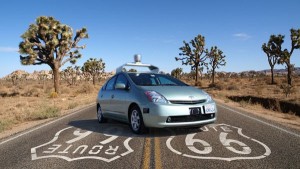By Alex Plough February 6, 2015

Google driverless car ©Sam Churchill/Flickr
The taxi-hailing app Uber faces its biggest threat not from government regulators or taxi driver unions, but from one of its biggest investors, the search engine giant Google.
On Monday, Bloomberg broke the news that Google is preparing to launch its own Uber-like service, likely in conjunction with its well known driverless car project. Veteran Bloomberg Businessweek tech writer Brad Stone revealed that David Drummond, Google’s chief legal officer, had informed Uber’s board of the possibility and Uber executives were shown screenshots of what appears to be a Google ride-sharing app that is currently being used by its employees.
The news is an indicator of the cutthroat nature of Silicon Valley as Drummond currently sits on Uber’s board of directors, a position he may soon be forced to resign. Not only that, but Google invested $258 million in Uber in August 2013 through its venture capital arm and less than a year later put additional investment into Uber’s next funding round.
The two companies are now on a collision course and the withdrawal of Google’s support could seriously harm Uber’s future as its app relies on Google Maps, by far the best mapping software on the market.
When Google made its initial investment, many analysts saw Uber as a takeover target or a long-term partner for a suddenly plausible future in which driverless taxis roam the streets looking for passengers. Now Uber will have to develop the technology itself or join forces with another firm developing driverless cars, though few are thought to be as advanced as Google in this field.
It seems Uber is doing the former. On Monday, TechCrunch reported that it was building a robotics research lab in Pittsburgh, PA to “kickstart autonomous taxi fleet development.” The project has hired talent from Carnegie Mellon University’s Robotics Institute to develop and commercialize autonomous driving technology for Uber’s fleet.
A blogpost on Uber’s website outlines the partnership, heralding what may be the start of the driverless taxi wars.
Death of a Hobbyists’ Paradise

Radioshack, Ohio ©Nicholas Eckhart/ flickr
The slow-motion collapse of RadioShack entered its final phase this week after the almost-century-old retailer closed in on an agreement with creditors that could put it in bankruptcy by the end of the week.
A proposed deal would sell the leases on as many as 2000 stores to Sprint Corp and the hedge fund Standard General, its largest shareholder. E-commerce juggernaut Amazon was also reportedly in talks to take over RadioShack locations in a bid to expand into bricks and mortar retailing.
The iconic firm can trace its roots back to 1921, when it began as a mail-order firm in Boston offering components to ham-radio operators. Over the years it transformed into a high street mainstay offering consumer electronics as well as a favorite haunt for hobbyists looking for hard-to-find parts.
It deftly anticipated the mobile revolution and was an early major retailer of cellphones, a product that would cause its downfall. RadioShack’s main products such as music players and personal computers eventually converged into one device, the smartphone, and suddenly the retailer had nothing to sell.
In recent years it tried to regain some of it’s original ‘maker’ spirit by offering in-store 3D printing and rebranding itself as ‘The Shack’ (and then quickly changing its name back). But such gimmicks couldn’t forestall the inevitable and in 2013 CEO Joe Magnacca summed the company up concisely, telling Huffington Post that “not many people hate us… we’re just not relevant to them.”
Heads Roll in Petrobras Corruption Scandal
This week, the CEO of Brazil’s state-run oil company Petrobras finally offered her resignation in an attempt to turn the page on the biggest corruption scandal in the country’s history.
Reuters has reported that Brazilian President Dilma Rousseff will replace Petrobras CEO Maria das Graças Foster, a close friend of the President, along with other senior officials by the end of the month.
The corruption scandal that cost Foster her job first emerged in March last year when police began investigating claims that Petrobras contracts were being overinflated and the cash used to pay off politicians.
Investigators eventually uncovered a sophisticated price-fixing, bribery and political kickback scheme that had funnelled at least $3.7 billion and perhaps more than $28 billion from Petrobras coffers into the bank accounts of corrupt executives and politicians.
Last week the company told investors that corruption was one of several factors that helped destroy a net 61.4 billion reais ($22.7 billion) from the value of its assets. Once worth $310 billion at its peak in 2008, a valuation that made it the world’s fifth-largest company, Petrobras is today worth just $48 billion.
The downfall will be seen by many as an allegory the country’s failure to live up to its economic promise, after it emerged from the global financial crisis as one of the world’s great rising powers.
Bankrupted By Beanies

A crew of teddy bear beanie babies. (they come in all kinds). Beanie Babies, teddy bear crew ©Bianca Ramirez
For those too young to remember the 1990’s Beanie Baby craze, pray that your parents didn’t invest their life savings in the stuffed toys that were once seen as a legitimate investment. The short documentary, ‘Bankrupt by Beanies’, charts one American family that spent over $100,000 on Beanie Babies in the hopes of becoming rich. While the idea sounds ridiculous now, Beanie Babies were an inexplicable hit when launched by plush toy manufacturer Ty Inc in late 1993. There was even a dedicated magazine called ‘Mary Beth’s Bean Bag World’ which ran for four years and at its peak sold over 650,000 copies a month. Today only a handful of Beanies are worth anything, a listing on Ebay for a “super rare” Princess Diana Beanie Baby is asking for over half a million dollars.
Earn it like Beckham?
How well do you kick a soccer ball? You are probably no match for Cristiano Ronaldo. And that goes for your annual salary, too. The BBC has created an infuriating but brilliant interactive, ‘How long would it take you to earn a top footballer’s salary?’, (or rather a soccer player’s salary) to answer exactly that question. Just enter your annual salary and the calculator will tell you how many minutes it takes a Premier League striker to earn your weekly salary, or more depressingly, how many hundred years it would take for you to pull in their annual wage.
****
Alex Plough is a freelance business journalist based in New York. Originally from London, England, he has a background in data-driven investigative reporting and has worked on a number of agenda-setting projects such as the award winning Iraq War Logs for the Bureau of Investigative Journalism. More recently he graduated from Columbia Journalism School’s masters program, business and economics reporting concentration, as well as Columbia’s Lede Program – a three month course designed to apply the tools of computer science to journalism. He is particularly interested in the overlapping fields of finance, technology and how young people are shaping the new American economy.
This entry was posted on Friday, February 6th, 2015 at 1:53 pm. It is filed under Week in Review and tagged with Beanie Baby, Cristiano Ronaldo, Dilma Rousseff, driverless cars, Google, Petrobas, Radioshack, Uber. You can follow any responses to this entry through the RSS 2.0 feed.
Comments are closed.
